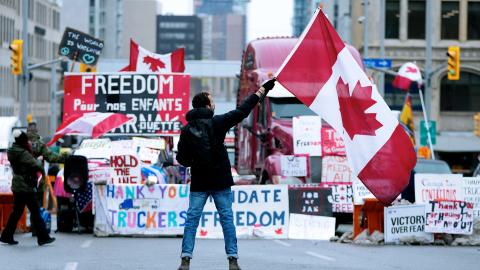
Canadian Judge Rules Trudeau Violated Constitution by Suppressing 'Freedom Convoy'
A Canadian judge has ruled the government's use of the country's Emergencies Act to suppress weeks of protests by truckers and others angry over COVID-19 restrictions in 2022 was unreasonable and unconstitutional.
Thousands of protesters jammed the streets of the capital of Ottawa and besieged Parliament Hill, demonstrating against vaccine mandates for truckers and other precautions, while condemning Prime Minister Justin Trudeau's Liberal government.
Trudeau invoked the act on Feb. 14, 2022, allowing authorities to declare certain areas as no-go zones.
"The use of the Emergencies Act allowed the government to arrest the leaders of the Freedom Convoy, freeze bank accounts of protesters, and seize donations of other citizens. Trudeau simply declared that the protesters were threats to the security of Canada that are so serious as to be a national emergency," George Washington University legal scholar Prof. Jonathan Turley noted in his blog.
The Canadian Civil Liberties Association and several other groups and individuals argued in court that Ottawa ushered in the emergency measures without sound grounds.
In his decision released Tuesday, Federal Court Justice Richard Mosley agreed, saying the use of the Emergencies Act led to the infringement of constitutional rights and was unreasonable.
"I have concluded that the decision to issue the Proclamation does not bear the hallmarks of reasonableness – justification, transparency, and intelligibility – and was not justified in relation to the relevant factual and legal constraints that were required to be taken into consideration," Mosley wrote.
"I conclude that there was no national emergency justifying the invocation of the Emergencies Act and the decision to do so was therefore unreasonable," the judge noted.
The court said the continuing protests throughout the country did not meet the legal threshold for invoking the act.
"The potential for serious violence, or being unable to say that there was no potential for serious violence was, of course, a valid reason for concern. But in my view, it did not satisfy the test required to invoke the Act particularly as there was no evidence of a similar 'hardened cell' elsewhere in the country, only speculation."
The judge also noted some of the protestors' "right of freedom of expression was infringed."
"One aspect of free expression is the right to express oneself in certain public spaces. By tradition, such places become places of protected expression…To the extent that peaceful protestors did not participate in the actions of those disrupting the peace, their freedom of expression was infringed," he wrote.
Deputy Prime Minister Chrystia Freeland said the government will appeal. Freeland said it was a hard decision to invoke the act but called the protests a serious threat to public safety, national security and Canada's economic security.
"I don't want to minimize the gravity of the actions we took. Neither do I want to minimize the gravity of the threats Canada faced," Freeland said.
The government contended the steps it took were targeted, proportional, time-limited and compliant with Canada's Charter of Rights and Freedoms.
A public commission led by another judge last year found Trudeau's government met the "very high threshold" for invoking the act and that most of the emergency measures were appropriate.
As CBN News reported, The Freedom Convoy inspired other convoys in the U.S., France, New Zealand, and the Netherlands as truckers protested COVID-19 shot mandates by the governments there.
For almost a week, the busiest U.S.-Canada border crossing between Windsor, Ontario, and Detroit was bogged down by delays. The Ambassador Bridge is the busiest international land border in North America with more than $323 million in goods crossing the bridge daily.



